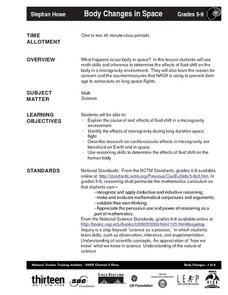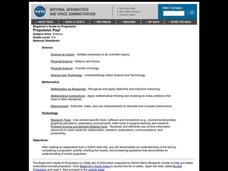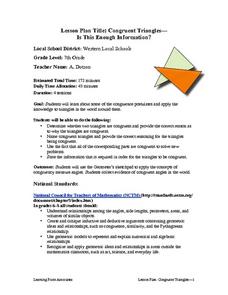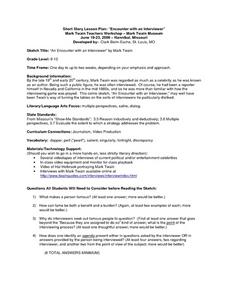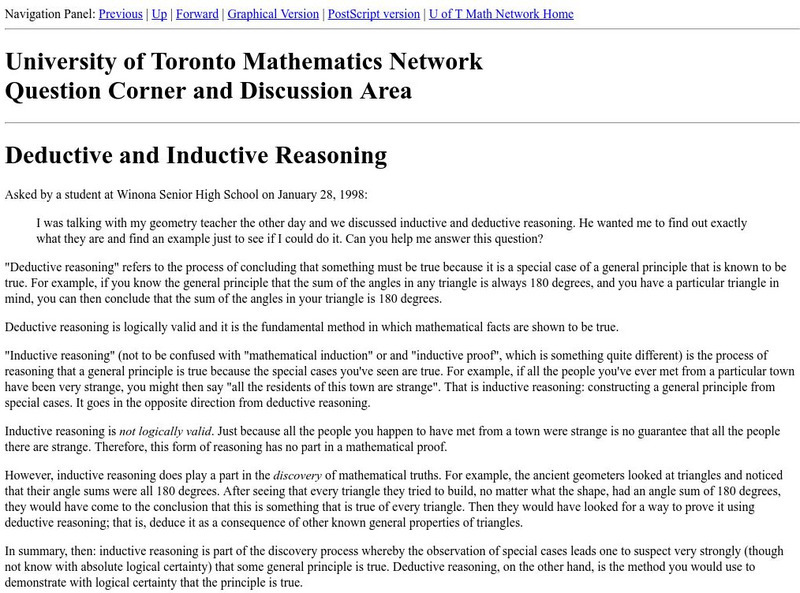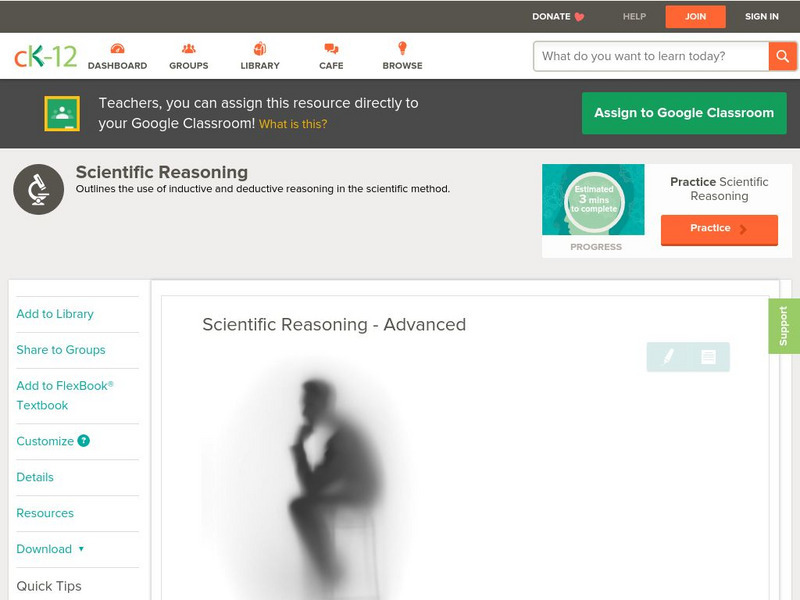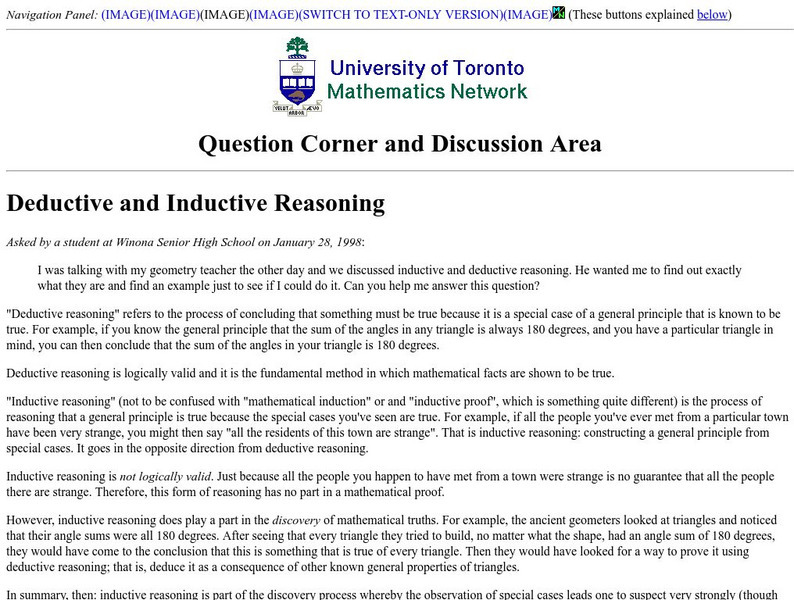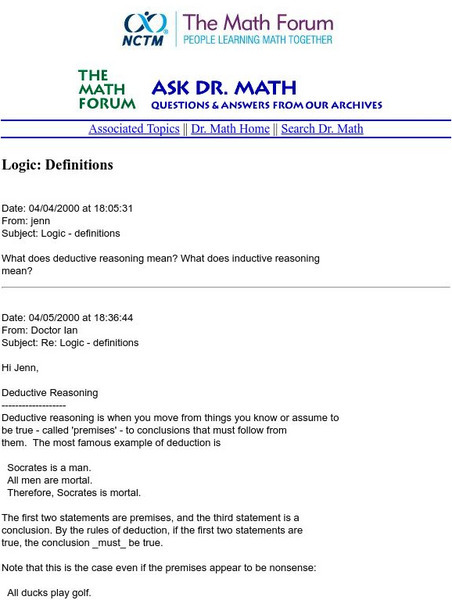Curated OER
What Would You Fly?
Learners, after reading an explanation from a NASA Web site, demonstrate an understanding of the text by writing an essay that applies the information found in the slides to a real-life question.
Pennsylvania Department of Education
Creating Polygons
Pupils describe, make and compare polygons. In this creating polygons lesson, students identify properties of quadrilaterals and describe common features of two dimensional shapes.
Curated OER
Body Changes in Space
Learners explain the cause of and effects of fluid shift in a microgravity
environment. Students identify the effects of microgravity during long duration space flight. Learners describe research on cardiovascular effects in microgravity...
Curated OER
Calendar and Opening
Students review the days of the week and tell what the current day is by singing a song. They fill in the sentence telling the day of the week it is and then discuss what day yesterday was and the name of the day tomorrow and then talk...
Curated OER
Propulsion Pop!
Students demonstrate an understanding of the text by completing a propulsion activity, charting the results, and answering questions that demonstrate an understanding of rocket propulsion.
Curated OER
Congruent Triangles - Is This Enough Information?
Seventh graders examine congruence postulates and apply knowledge to triangles in the world around them.
Curated OER
What was Newton's Idea of Science?
Students form logical foundations for analysis of observations. They improve analytic reading abilities through practice. Students investigate the foundations of scientific thought processes and how to apply them.
Curated OER
Plant Motion: The Untold Secrets
Learners identify and categorize knowledge needed to design an experiment. They observe, recognize and describe the motion viewed. They document any changes caused by various solutions.
Curated OER
Encounter with an Interviewer
Students read the Mark Twain short story, Encounter with an Interviewer. They study "the interview" and discuss the role of the interviewer and the person being interviewed. They conduct mock interviews, constructing questions and...
Texas Education Agency
Texas Gateway: Distinguishing Between Inductive and Deductive Reasoning
This lesson focuses on distinguishing between inductive and deductive reasoning. Sometimes it's difficult to separate these two types of reasoning because we often use them together; drawing conclusions in inductive reasoning is likely...
Science Struck
Science Struck: Examples of Deductive Reasoning
Learn what deductive reasoning is and look at examples of how to apply it.
San Jose State University
San Jose St. Univ.: Inductive and Deductive Reasoning
Resource distinguishes between the two forms of argument: deductive vs. inductive reasoning by providing examples and explanations. There are also some practice exercises given to further your understanding.
CK-12 Foundation
Ck 12: Geometry: Types of Reasoning Study Guide
[Free Registration/Login may be required to access all resource tools.] Reasoning is a fundamental part of geometric proofs. There are several types of reasoning, many of which we innately and naturally picked up. However, the different...
University of Toronto (Canada)
University of Toronto: Deductive and Inductive Reasoning
Part of a University of Toronto website, this page defines and describes deductive and inductive reasoning in solving mathematical problems.
Web Center for Social Research Methods
Research Methods Knowledge Base: Deduction and Induction
This site provides a good explanation of deductive and inductive thinking.
CK-12 Foundation
Ck 12: Scientific Thinking: Scientific Reasoning Advanced
[Free Registration/Login may be required to access all resource tools.] Find out about how people use scientific reasoning to think scientifically. Included in the assignment is a four minute video and review questions.
University of Toronto (Canada)
Question Corner: Deductive and Inductive Reasoning
A simple discussion of the differences between inductive and deductive reasoning. Helpful to anyone who is having difficulty differentiating between the two.
CK-12 Foundation
Ck 12: Scientific Reasoning
[Free Registration/Login may be required to access all resource tools.] The differences between deductive and inductive reasoning are described in this lesson.
National Council of Teachers of Mathematics
The Math Forum: Ask Dr. Math: Logic Definitions: Inductive & Deductive
This site explains what deductive and inductive reasoning is. The site also explains abductive reasoning.
PBS
Pbs Learning Media: Teaching Tips: Deductive and Inductive Reasoning (1St Grade)
Use these teaching tips from the PBS Kids Lab to help children make sense of problems and persevere in solving them, determine the unknown whole number in an addition or subtraction equations, use addition and subtraction within 20 to...
Texas A&M University
Wtamu Virtual Math Lab: Beginning Algebra: Reasoning Skills
A tutorial on reasoning skills focusing on both inductive and deductive reasoning. Has several examples and exercises with answers and discussion.
Biology 4 kids
Biology4 Kids: Logical Reasoning
Learn how logic and reasoning play a part in everyday thinking, and how deductive and inductive reasoning leads investigators to conclusions.
Other
Aristotle & Logic: Syllogisms & Inductive Reasoning
From a larger college website, this page provides a good description of syllogisms as well as inductive reasoning.
New Advent
Catholic Encyclopedia: Induction
Excellent article that clearly explains the meaning and significance of "induction" in the history of philosophy. Relates the concept to philosophy of science as well as epistemology, demonstrating how the issues raised by induction are...




